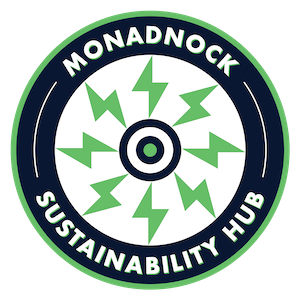By Patricia Beffa-Negrini, Ph.D., Originally Published in The Monadnock Shopper News, Green Monadnock column, November 2024
What do healthy habits like taming your sweet tooth, minimizing meat, and loving local have to do with climate pollution? Let’s explore.
First, consider sugar-sweetened and artificially sweetened beverages. Sodas, sports drinks, energy drinks, sweetened fruit drinks, vitamin drinks, sweet and chai teas, and lattes are leading contributors to obesity, particularly in children. A 20-ounce soda contains an average of 16 teaspoons of sugar, double the recommended daily limit for added sugar.
People who drink sweetened beverages tend to gain more weight than those who don’t because liquids do not fill us up, and therefore, we can consume more calories than we should. Sugar-sweetened beverages cause our blood sugar to fluctuate, making us hungrier and putting us at risk for diabetes. Drinking artificially sweetened beverages has a strange effect that can trigger sugar cravings; therefore, they are linked to weight gain, not weight loss.
Sweet beverages are linked to climate pollution because they are often sold in single-use plastic containers made from fossil fuels. Most of these containers are not recycled; instead, they are disposed of through incineration, contributing to air pollution. The U.S. plastics industry is responsible for at least 232 million tons of CO2 emissions annually—equivalent to the emissions from 116 average-sized coal-fired power plants.
But if your sweet tooth is your constant companion, going off sweet beverages cold turkey may be challenging. Perhaps try Sweet-Drink Free Sunday. Enjoy plain or flavored tap water with lemons, cucumbers, or fresh berries. Keep track of how many fewer plastic bottles you use. You might even lose a few extra pounds.
Follow with Meatless Monday. Meat—mainly processed meats like hot dogs, cold cuts, and bacon—is not the best choice for our health or the planet. Take data from 55,504 individuals’ diets—plus information from 38,000 farms in 119 countries—and what do you find? Peter Scarborough, a professor of population health, found something incredible. Those who ate only plant-based foods compared to those eating 3.5 ounces of meat daily—less than a “quarter-pounder”—were responsible for 75% fewer climate-warming gases, 75% less land use, 66% less biodiversity loss, and 54% less water consumption.
Many do not want to hear, “Eat less meat.” However, comparing burning coal, our dirtiest fuel, to producing beef: Burning 1 pound of coal releases 4 pounds of carbon into the air, while producing 1 pound of beef releases 100 pounds! Small changes in meat consumption can make a big difference.
Would eating food you grow yourself or from a community garden or farmers’ market help you and the planet? Regionally grown foods are eaten close to their peak ripeness when beneficial antioxidants, polyphenols, and vitamins A and C are at their highest. Local foods, typically sold within 24 hours of harvesting, have shorter supply chains. Not only will this improve nutrition and flavor, but it will also mean less distribution and handling, thus generating fewer carbon emissions. Local foods are less processed, have fewer food additives, and are less likely to come packaged in plastics, which are vectors for toxins.
When you garden at home, advantages come to you along with that harvest of lettuce, tomatoes, and cucumbers: physical and mental health benefits! Digging outdoors in the soil provides weight-bearing exercise and vitamin D from the sun, which is great for strengthening bones, preventing osteoporosis, and assisting with joint and muscle flexibility. You’ll stay active and expend more calories, which can help prevent weight gain and diabetes. Gardening proves to be a boost for your brain, potentially enhancing your mood and reducing the risk of dementia. Luxuriate in the mindfulness and satisfaction of gardening’s fresh air and fresh food—your body and brain will thank you.
Perfection is not the aim. However, the more often you make better beverage choices, munch on meatless meals, and eat local—considering not only nutrition but also packaging—the more you’ll be doing something healthy for yourself and the Earth. As the environment becomes cleaner and more resilient, you will become even healthier. I hope you will join me on this journey to a more sustainable lifestyle that will improve the climate and lead us to a healthy future.
Patricia Beffa-Negrini, Ph.D., is a retired Registered Dietitian/Nutritionist who lives in Nelson and is a board member of the Monadnock Sustainability Hub, a New Hampshire nonprofit that aims to cut emissions in our region and thus address climate pollution. She is also a member of the NH Network’s Plastics Working Group. Her email is nelsoncommunitypower@gmail.com.
